Snippets from Goettingen: Dr. Anna Schultz*
Anna, mother of twin grown up boys, teaches in the agriculture division of the Goettingen University. My daughter first came in touch with Anna in a virtual Indo-German interactive session in the university. During that interaction one German student said, ‘I like to work with the Indians.’
- Why?
- They can handle uncertainties better.
Later Anna called my daughter for coffee and became friends. When we were at Goettingen she came home to see us.
To us, Anna looked a quintessential German lady with love for her country, a remarkable capacity to think, articulate and listen. Being a yoga enthusiast, she performs a number of Asanas regularly- Surya Namaskar and Sheershasana (headstand) among them. For the mind, she sings, reads about Buddhism and practises non-violent communication where the ethos is ‘Either you are happy or you are right.’ And the typical question is, ‘What do you (or I) need?’, not ‘What do you want?’. Anna and her husband are currently on a mission to walk down from Germany to Spain. They cover some distance, get back to work and go again to resume hiking from where they left.
Anna became our source to satisfy many curiosities on Germans and Germany. We asked her why the Germans are so averse to get photographed. She said, ‘Photos can be used for malicious purpose. Suppose, someone takes a photo and then claim to others, ‘Here’s my German girlfriend!’
On politics she comes up with this one from Oscar Wilde
Person A: “Tell me the truth, pure and simple!”
Person B: “The truth is rarely pure – and never simple.”
Growing up in West Germany, she does not have kind thoughts on the socialist rule in the eastern part. A para in her own words, “One of my husband´s uncles tried to flee from GDR (“socialist” Germany) when he was still at school. They caught him, and only because he was so young he did not need to go to prison. But he was not allowed to study at university. His wife was also not allowed to study. She is Christian and did not join the socialist youth movement. So she was excluded from university. They (aunt and uncle) reported that their children had to stand up in front of class at school, the teacher told the other students:” These children believe in God. Laugh at them!” and the other kids did.”

Equality Equity Same size for all
Three pictures Anna sent to explain the failure of socialism
The grown-up Germans feel terribly uneasy about living with their parents for long. Our planned stay of over two months with our daughter met first with disbelief, then worries about how are we spending our time. Some came to meet us, some called home while Anna offered us a day trip to the famous Harz Mountain. One day in September together with my wife I took a 40-minute train ride from Gottingen to Bad Gandersheim, the small town where Anna lives with her physician husband Dr. (med) Helmut Schultz. came to receive us at the station.
On seeing us, Anna’s first question was, ‘It is chilly today, are you warm enough? Are you wearing another layer of clothing inside? In her car she brought extra warm clothes for us. Before coming to Germany many cautioned us about the Germans being not quite hospitable- that idea received a jolt from Anna. Giving a lie to German coldness to hospitality, she carried two flasks full of hot tea and food aplenty for all of us. Finally, while seeing us off at the train station, she packed some for our daughter.
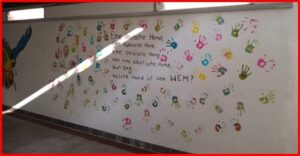
We came across this very touching artwork for multiculturalism inside Bad Gandersheim station subway. The message written in German says, ‘A German hand, a Turkish hand, a Serbian hand, an Asian hand. Now say, which hand is whose?
While travelling around the small town of Bad Gandersheim and later near her childhood home, we learnt about the complex German school system from Anna. It seems they separate those who would go for vocational training just after primary level. I was surprised because my idea was going to vocational school so early may make them thoughtless, insensitive human beings (which I realise now, cannot be true). However, the school systems are much varied as the sixteen different states in Germany have their say on curricula.
Anna, a doctorate, earns 20 Euro per hour for which she travels long distance. On the other hand, engaging a worker costs 12 Euro per hour. It becomes much higher after working hours, even double on holidays. Therefore, people do not bother much if their children go into vocational stream and start earning early. However, recently that preference is changing the Indian way. As a consequence, Germany is now facing a crisis of working hands in the vocational arena. An Indian student (Gopal) told me, almost all of the white people who do the hands-on dirty jobs like digging/cleaning etc. are immigrants from East Europe. That the German population is declining over 25 years now is not helping matters. On another side the effect of such closeness of wages on educated women is, many are preferring to stay home and look after the children, because engaging a baby-sitter may eat away whatever they earn.
Riddled under the pressure of strong individualism, Germany is striving to foster togetherness, we noticed that the cost of the train ticket to Bad Gandersheim was the same for 1 to 5 persons. We also heard that getting a plot for building one’s house is easier for a couple living with parents.
One wonder in Germany- the rule of printed matter is far from over; book reading is quite prevalent. The other wonder is, finding computer savvy people like Anna looking for directions on printed maps. While driving she lost way for once, but still refused our assistance with Google maps. People read books. Once over, many leave them in prominent places for others to take away.
Anna took us to the small town of Clausthal where a technical university once famous for mining engineering is located. Till the first few decades of twentieth century the city used to be a mining hub for metals including silver. Now a few granite and chalk quarries stand as reminders of its heydays. In front of the technical university stands a drab looking (but beautiful inside) huge wooden church painted in dull blue. Later in the town of Hahnenklee we visited a smaller Norwegian type wooden church put together with wooden joints only (without using nails).
The Norwegian style church (1908) at Hahnenklee (outside and inside).
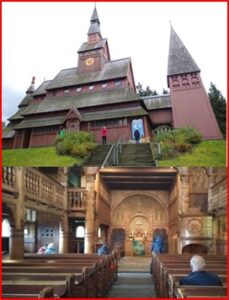
View of Hahnenklee from mountain top. There is a cable ride system in open benches (see right)
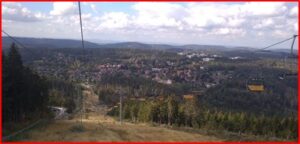
In between, we had a scenic cable car ride to the top of a peak where we had lunch, again in an wooden restaurant that displayed the currencies of countries from which its guests came. I saw a Indian 100 rupee note pinned among them. Germany has rebuilt its forest cover destroyed due to felling and war. However, the transition from traditional local trees to selective fast-growing ones led to new bug problem. Traditionally a village is supposed divide its area equally among residential quarters, fields for cultivation and forests (pastures). On the cable car, Anna confided that her brother and father are hunters. She showed us small elevated wooden chambers in the forest below where the hunters wait for their target. Getting a hunting licence in Germany involves compulsory training. Once trained, they are permitted to kill specific animals of specified age only. The training imparts the skill of execution with a single shot. I reminded her that many think the animals should be allowed natural death. Anna brought a new perspective with, ‘Those people need to understand that natural death for most of such animals means being mauled and at times devoured alive by a pack of wolves. Is that less painful?’
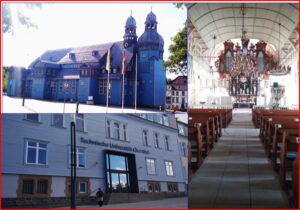
The Blue church at Clausthal (outside and inside) and the Technical University
Any interesting student? There was one from Pakistan. Anna asked him, ‘How are you here?’ ‘In Pakistan, army job is very good. I tried thrice- after tenth grade, after twelfth and after graduation. Failed every time. Then I wanted to do farming. My family did not allow. Therefore, I am here to study.’, was the answer. This corroborated with what a Pakistani (Sindhi) asylum seeker in small town Duderstadt told us, the army controls everything in Pakistan, even business.
1st November, 2022 Arijit Chaudhuri
About the author
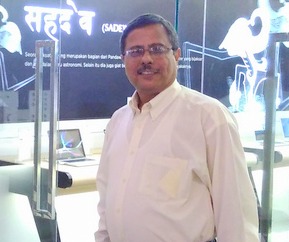
Arijit Chaudhuri, located in Navi Mumbai, petroleum geologist by profession. Also interested in issues concerning pollution, climate change and fast depleting groundwater reserves.Travelling, reading, writing articles, composing rhymes and recitation are his hobbies.

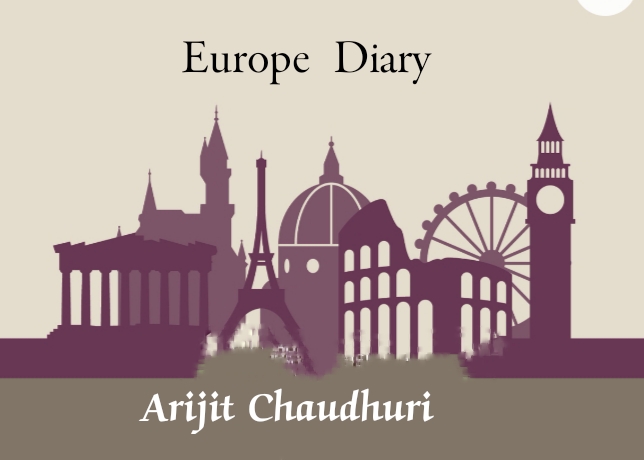
Excellent article by Mr.Arijit Chaudhury.
One could visualise and feel the warmth of interior Germany. Such experiences reflected through such articles are highly solicited. All the best.
Wonderful narrative, as if a portrait is being painted with much love and due care..the pictures from the very interior places in Germany, as viewed by the author with his very sensitive eyes and ever questioning mind are described so eloquently, they are a real treat to go through..so while I wait eagerly to know more about this delightful journey through the remaining part of your diary..All the best to you Mr.Chaudhuri..